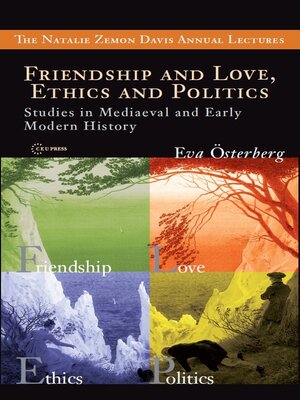Friendship and Love, Ethics and Politics
ebook ∣ Studies in Mediaeval and Early Modern History · The Natalie Zemon Davis Annual Lectures Series
By Eva Österberg

Sign up to save your library
With an OverDrive account, you can save your favorite libraries for at-a-glance information about availability. Find out more about OverDrive accounts.
Find this title in Libby, the library reading app by OverDrive.



Search for a digital library with this title
Title found at these libraries:
| Library Name | Distance |
|---|---|
| Loading... |
Today, friendship, love and sexuality are mostly viewed as private, personal and informal relations. In the mediaeval and early modern period, just like in ancient times, this was different. The classical philosophy of friendship (Aristotle) included both friendship and love in the concept of philia. It was also linked to an argument about the virtues needed to become an excellent member of the city state. Thus, close relations were not only thought to be a matter of pleasant gatherings in privacy, but just as much a matter of ethics and politics.What, then, happened to the classical ideas of close relations when they were transmitted to philosophers, clerical and monastic thinkers, state officials or other people in the medieval and early modern period? To what extent did friendship transcend the distinctions between private and public that then existed? How were close relations shaped in practice? Did dialogues with close friends help to contribute to the process of subject-formation in the Renaissance and Enlightenment? To what degree did institutions of power or individual thinkers find it necessary to caution against friendship or love and sexuality?







